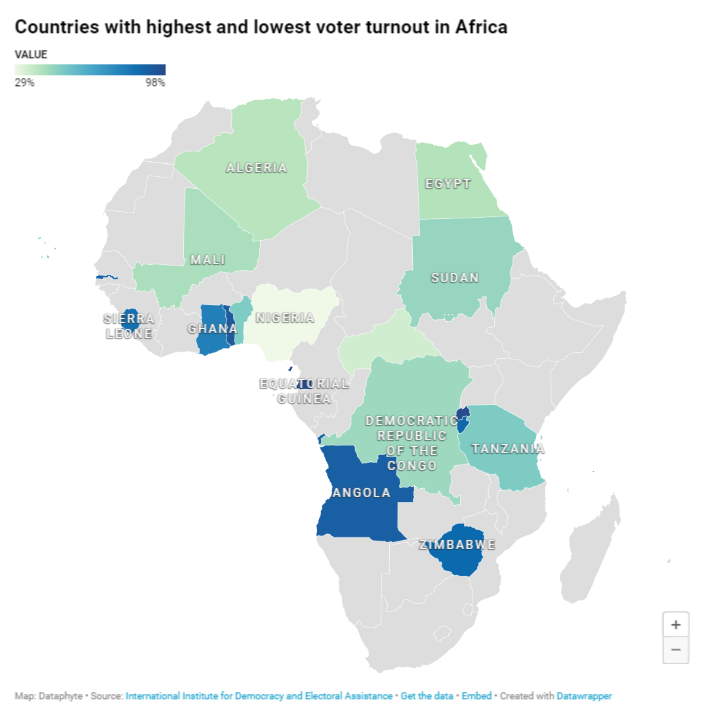Insight Nigeria emerges largest African democracy with lowest voter turnout
…Only three out of 10 people turned out to vote
Though Nigeria is the largest democracy in Africa, data from the just concluded presidential election show that the country has the lowest voter turnout rate on the continent.
According to the Independent National Electoral Commission (INEC), for the first time in history since the return of democracy in 1999, Nigeria’s voter turnout was 29 percent. In other words, roughly three out of 10 voters who registered and obtained their permanent voter cards (PVCs) actually cast their votes.
Voter turnout is calculated as the percentage of total number of accredited voters divided by the total number of registered voters (the summation of the total number of valid votes and the total number of rejected votes divided by total registered voters) obtained at the end of the election.
READ ALSO: International observer groups flag Nigeria’s presidential election
The rate of voter turnout in the 2023 election in Nigeria was the lowest of all recent elections held on the African continent, according to the data from the International Institute for Democracy and Electoral Assistance (I-IDEA).
The data revealed that Equatorial Guinea in its 2022 presidential election recorded the highest — 98.4 percent. Top 10 countries with the highest voter turnout in their most recent elections are: Equatorial Guinea, 98.4 percent; Rwanda — 98.2 percent; Togo — 92.3 percent; Angola — 90.4 percent; Gambia — 89.3 percent; Seychelles — 88.5 percent; Burundi— 87.7 percent; Zimbabawe — 86.6 percent; Sierra Leone — 84.2 percent; and Ghana —78.9 percent. 
The 2023 presidential election was a hotly contested race in which three out of the 18 candidates, for the first time, had possible likelihood of victory.
About 87.2 million Nigerians out of the 93.4 million registered voters had collected their permanent voter cards (PVCs), qualifying them as eligible voters, but only 25.43 million exercised their franchise in Africa’s biggest democracy. Barely nine million people voted for President-elect, Bola Tinubu, who will now lead more than 200 million Nigerians.
Even though Nigerians were more interested this year than ever before in taking part in the electoral process, there were several factors that contributed to the low voter turnout for the presidential election, including voter suppression, poor planning, and election mismanagement that involved INEC’s tardy deployment of officials and materials to polling places.
In Kenya, two-thirds of voters cast their ballots in the presidential election that held in August 2022.
Despite Nigeria having four times as many eligible voters as Kenya, William Ruto, the winner, garnered only four-fifths of the votes that Tinubu did.
Several polling units were opened hours later than scheduled by electoral officials, who also struggled to operate the Bimodal Voter Accreditation System (BVAS). As a result, a number of Nigerians who had intended to participate went home without casting their ballots.
According to a report by YIAGA Africa, fewer than half of the polling units had commenced voting as of 9.30 a.m., one hour after they were scheduled to open.
The Director of the Centre for Democracy and Development (CDD), Idayat Hassan, said the low participation might be due to the failure of democracy to deliver development in Nigeria.
“The failure of democracy to deliver development has made many not to have interest in participating in elections,” she said, adding that “violence and voter suppression also played a huge role in diminishing voter turnout.”
An associate fellow of the Africa Programme at Chatham House, Leena Hoffmann, said: “These dwindling numbers highlight how Nigeria’s politics and state institutions continue to exclude rather than include.”
The commission’s patchy deployment of technology in the use of a BVAS is still being intensely scrutinised and criticised. It failed to adhere to its own guidelines, which derive from its laws, that election results would be uploaded to its portal using the BVAS directly from the polling unit in real-time for public’s viewing.
Presidential
Stay informed with the Nigerian Presidential Elections. Get updates on candidates, schedules, voting guidelines, and election results. Stay engaged and make your voice heard.
Senatorial
Stay informed with the Nigerian Senatorial Elections. Get updates on candidates, schedules, voting guidelines, and election results. Stay engaged and make your voice heard.
House Of Representatives
Stay informed with the Nigerian Federal House of Representatives Elections. Get updates on candidates, schedules, voting guidelines, and election results. Stay engaged and make your voice heard.
Gubernatorial
Stay informed with the Nigerian Gubernatorial Elections. Get updates on candidates, schedules, voting guidelines, and election results. Stay engaged and make your voice heard.
Recent insights
We provide real-time updates, analysis, and coverage of all major Nigerian elections.
